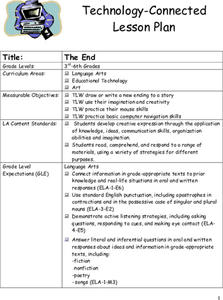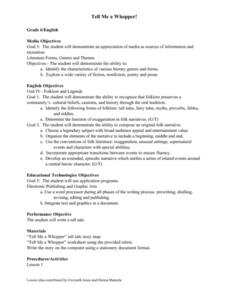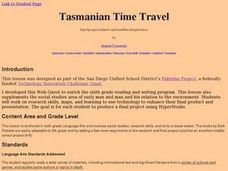National First Ladies' Library
States' Rights: 1798-1860
Students develop an annotated timeline specific to the concept of States' Rights. They research an example to the doctrine noting how the ideas change and beome more specific as time passes and discuss their findings through class...
Curated OER
The End
Learners listen as the teacher reads a story. Pictures are displayed as the teacher reads the story. Students jot down ideas for the story ending, and create an illustration to compliment their story. Student story endings and...
Curated OER
Tell Me a Whopper!
Sixth graders investigate tall tales as a literary genre. They listen to a number of tall tales to discover how exaggeration is used as a story element. They write and publish a tall tale using word processing software. They illustrate...
Curated OER
Tasmanian Time Travel
Sixth graders perform research using the Internet about the Tasmanian Devil. The project can be presented in a variety of ways. The use of computer software is important for students to know, specifically Hyperstudio.
National First Ladies' Library
Are We There Yet?
Pupils study the wide-reaching effects of the Cold War, even to its involvement in domestic road construction. They research the National Defense Highway System (Eisenhower Highways) for information about the creation of the program, the...
National First Ladies' Library
Fitness for Life
Students discuss their favorite activities and determine which activities are suitable for older people. In groups, students research the benefits of aerobic exercises and the equipment needed. Students share their information with the...
National First Ladies' Library
Rock the Vote! But When?
Middle schoolers research and examine about voting turnouts in the United States and around the world. They assess about various aspects of the so-called "youth vote," and have an opportunity to consider the meaning of the vote in a...
Curated OER
Destination Reading
Students practice reading skills and comprehension through the use of computers and the educational software "Destination Reading" provided by Riverdeep in this self-directed lesson.
ReadWriteThink
Read Write Think: Reading/writing About Whales Using Fiction and Nonfiction Texts
Students will have a whale of a good time in this lesson in which they use fiction and nonfiction texts to write a letter to an online scientist.
ReadWriteThink
Read Write Think: Animal Study From Fiction to Facts
Contains plans for five 50-minute lessons that ask students to compare and research information about animals from fiction and nonfiction texts. In addition to student objectives and standards, these instructional plans contains links to...
British Library
British Library: 19th Century Non Fiction Texts: Work & Welfare
This thematic collection will allow students to read and understand 19th-century non-fiction texts, and support them in identifying key features for a range of genres, audiences, and purposes. Each source is accompanied by original...
British Library
British Library: 19th Century Non Fiction Texts: Gender, Behaviour & Etiquette
This thematic collection will allow young scholars to read and understand 19th-century non-fiction texts, and support them in identifying key features for a range of genres, audiences, and purposes. Each source is accompanied by original...
Florida Center for Reading Research
Florida Center for Reading Research: Fiction and Nonfiction Sort [Pdf]
A lesson plan in which learners look at different books, write their titles, and sort them according to whether they are fiction or nonfiction. Materials are included.
Better Lesson
Better Lesson: Analyzing Text Complexity of Non Fiction Sources
This instructional activity will help students read and comprehend nonfiction, specifically biographies, through determining criteria for text complexity. Included is a PDF and Smart Notebook titled Determining Text Complexity, and an...
TES Global
Tes: Non Fiction Unit 4 Formal/impersonal Writing: Tourists
[Free Registration/Login Required] Young scholars will analyze tourism brochures to determine features related to nonfiction writing in this unit. Tourism websites may be used in lieu of the brochures. Cotswold and the North Leigh Roman...
TES Global
Tes: Analyzing & Comparing Non Fiction
[Free Registration/Login Required] Resource notes to aid students as they analyze different types of nonfiction. The GAP (genre, audience, and purpose) acronym is provided to use when comparing nonfiction texts.
Read Works
Read Works: 1st Grade Lesson: Purposes for Reading
[Free Registration/Login Required] A lesson in which students use the books Nature's Food Chains: What Polar Animals Eat by Joanne Mattern, Life Cycle of a Frog by Angela Royston, and Froggy Goes to School by Jonathan London to learn to...
ReadWriteThink
Read Write Think: Text Features: Non Fiction [Pdf]
Compare the printed page to an electronic web page and use this activity to discuss the similarities and differences. A cross-curricular tie-in with ecosystems. Could easily be adapted to another subject area.
TES Global
Tes: Guided Reading Resources: Nonfiction
[Free Registration/Login Required] This learning module contains several guided reading resources. Students will be able to use the charts to guide themselves as they discuss informational texts and persuasive texts. Teachers can monitor...
South Carolina Educational Television
Know It All: Non Fiction Text Features
Fifth graders will use non-fiction books to identify and explain how text features help them as individual readers.
Read Works
Read Works: 1st Grade Lesson: Classifying Texts
[Free Registration/Login Required] A lesson in which students use the books Froggy Goes to School by Jonathan London and Life Cycle of a Frog by Angela Royston to learn to classify texts as fiction or nonfiction. Lesson includes direct...
Scholastic
Scholastic: Teaching With Nonfiction: Teach Text Features
A brief lesson plan, this site offers an example of non-fiction text and a graphic organizer to help orient students to the features they need to use when reading for information.
Read Works
Read Works: Explicit Information 1st Grade Unit
[Free Registration/Login Required] A two-lesson unit in which learners learn how to identify explicit information in both fiction and non-fiction texts. The lessons utilize the books Frogs by Gail Gibbons and Stellaluna by Janell Cannon....
Read Works
Read Works: Main Idea 1st Grade Unit
[Free Registration/Login Required] Students learn to use titles and supporting details in both fiction and non-fiction texts in order to identify the main idea of the book in this three-lesson unit. The lessons utilize the books Animal...











![Florida Center for Reading Research: Fiction and Nonfiction Sort [Pdf] Lesson Plan Florida Center for Reading Research: Fiction and Nonfiction Sort [Pdf] Lesson Plan](https://content.lessonplanet.com/knovation/original/509105-4469283d2301f2d80ae09183a55b8e2c.jpg?1661786967)








